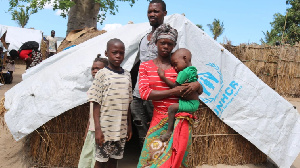
The World Food Programme (WFP) said about 950,000 people are starving in Mozambique
GENEVA, April 14 (NNN-AGENCIES) — Almost one million people are facing severe hunger in northern Mozambique where a worsening conflict has driven hundreds of thousands from their homes, the United Nations agency has warned.
Daesh-linked fighters last month attacked Palma, a town in the gas-rich province of Cabo Delgado, sending residents scattering towards all directions in a desperate attempt to reach safety. It was the latest attack by an armed group known locally as al-Shabab that has been plundering towns and villages since 2017.
On Tuesday, the World Food Programme (WFP) said in a briefing in Geneva that 950,000 people are hungry in Mozambique.
“Families and individuals have had to abandon their belongings and livelihoods and flee for safety … adding to an already desperate situation in northern Mozambique,” said Tomson Phiri, a WFP spokesman.
One heavily pregnant woman fled with her child after her husband was murdered in front of her, according to aid organisations. A teenager watched as his mother was murdered in a field. There were also reports of rape and kidnapping.
“We had to run away in the night and hide in the bush for two days with nothing, nothing at all,” Halima Adhu Jose said from Pemba, the provincial capital further south of Palma where thousands of displaced people streamed into.
“We managed to come with the boats, but now we aren’t able to get enough to eat. My children are hungry and I have nothing to give,” said the 32-year-old, who was a food vendor in Palma. “I don’t know how long we can continue to live with nothing.”
WFP appealed to donors for $82m to confront the crisis, a day after Mozambique’s National Institute for Disaster Risk Management and Reduction said it also needed seven billion meticais ($126m) to help those fleeing violence in Cabo Delgado, according to Portugal’s state news agency Lusa.
The UN International Children’s Emergency Fund (UNICEF) said it was currently caring for more than 200 displaced children whose parents could not be found.
“We are facing a likely long-lasting humanitarian crisis,” Manuel Fontaine, UNICEF’s director of emergencies, told the same briefing in Geneva.
Some 690,000 people were already displaced across the country by February. Another 16,500 have since been registered in other areas of Cabo Delgado after fleeing the attack in Palma, according to the International Organization for Migration.
Tens of thousands more are still displaced within Palma district or are on the move, the UN’s humanitarian coordination agency, OCHA, said on Monday.
Many fled to a nearby village called Quitunda, built by French energy giant Total to house those displaced by its $20bn gas project next to Palma.
People there have little access to food, no protection and gather in their hundreds at Total’s site every day desperate for evacuation, a witness said.
Total pulled its staff from the site due to nearby activity on April 2, while the WFP also halted evacuation flights it had been operating. The company has also suspended related operations in Pemba, a source with direct knowledge of the matter told Reuters.
Authorities are still working to identify 12 beheaded bodies found in Palma after the attack, which police and army officials said were believed to be foreigners.
Attacks by al-Shabab, whose origins, analysts say, are steeped in local political, religious and economic discontent, have steadily increased in Cabo Delgado since October 2017.
The sophistication of the attacks has increased, too.
The fighters have ransacked towns and gained control of key roadways. They have abducted young women and children and beheaded civilians. They have destroyed infrastructure and even expanded their sphere of operation north into neighbouring Tanzania. And since August 2020, they have been in control of the key Mozambican port town of Mocimboa da Praia.
In early March, rights watchdog Amnesty International accused both the fighters and Mozambique’s security forces, as well as a South African private military firm hired by the government, of war crimes against civilians, including extrajudicial executions and acts of torture. — NNN-AGENCIES






